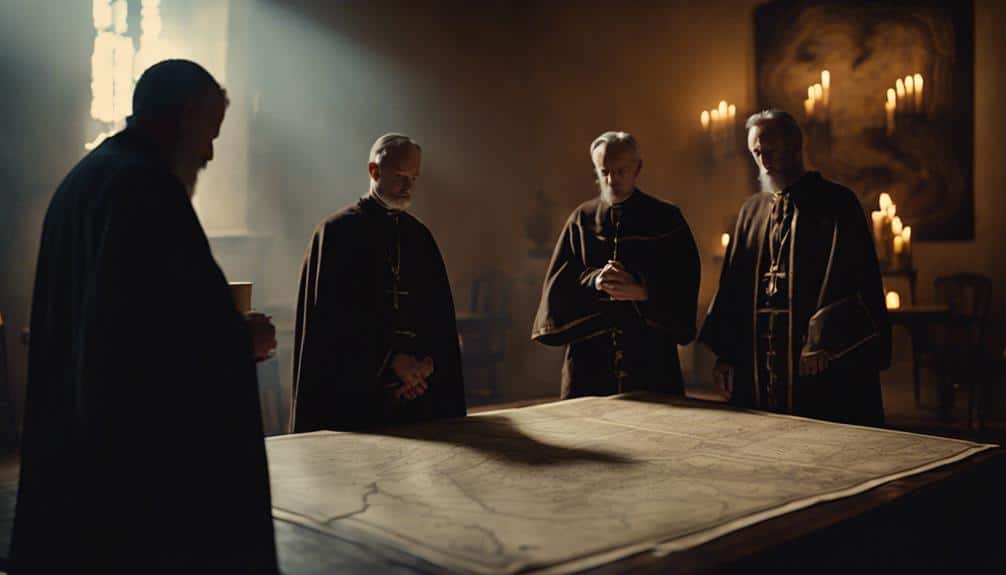Discover how the Jesuits, founded by Ignatius Loyola in 1540, became pivotal in the Counter-Reformation through military-like discipline, rigorous education, and global missions.
Uncover the intricate tactics and immense impact they had on education and the spread of Catholicism worldwide.
Founding of the Jesuits
In 1540, Ignatius Loyola founded the Society of Jesus, known as the Jesuits, with the aim of defending and spreading Catholicism through a military-like order. Ignatius of Loyola, a Spanish knight turned religious leader, designed this organization to operate with the discipline and rigor of a military unit. His Spiritual Exercises, a crucial text for the Jesuits, laid out a framework for rigorous mental and spiritual training, emphasizing obedience, devotion, and the mission of the Catholic Church.
The Jesuits quickly became recognized as 'soldiers of God,' operating under a hierarchical structure where the leader was titled the general. This military terminology reflected their strategic approach to religious missions, education, and political influence. Loyola's methods, which included fervent proselytizing and strategic positioning within powerful circles, garnered both admiration and criticism. Some viewed the Jesuits as an essential force for the Catholic Church's renewal, while others saw their tactics as controversial and overly aggressive.
Ignatius of Loyola's vision transformed the Society of Jesus into a powerful entity within the Catholic Church, driving its mission with unparalleled zeal and strategic acumen. This foundation set the stage for the Jesuits' significant impact on global Catholicism.
The Counter-Reformation

As the Protestant Reformation gained momentum, the Catholic Church launched the Counter-Reformation to strengthen its doctrines and reclaim adherents. This movement, also known as the Catholic Reformation, aimed to address internal corruption, reinforce core beliefs, and counteract Protestant growth.
Central to these efforts was the Council of Trent, convened from 1545 to 1563, which sought to clarify and codify Catholic teachings while enacting significant reforms in church practices. The Council's decrees tackled issues such as the sale of indulgences, clerical discipline, and the establishment of seminaries to guarantee well-educated clergy.
Key to the Counter-Reformation was the Society of Jesus, or the Jesuits, founded by Ignatius of Loyola. The Jesuits became the vanguard of Catholic renewal, emphasizing rigorous education, missionary zeal, and unwavering loyalty to papal authority.
They established schools and universities across Europe, which became bastions of Catholic doctrine and intellectual vigor. Jesuit missionaries ventured to distant lands, spreading Catholicism and countering Protestant influence.
Views on Justification

The concept of justification reveals a profound theological divide between Catholicism and Protestantism, each offering distinct perspectives on how sinners achieve righteousness before God. For Catholics, as defined by the Council of Trent, justification involves the remission of sins, sanctification, and the renovation of the inner person. They believe that the Holy Spirit infuses righteousness into the believer, transforming their very nature.
In contrast, Protestant Reformers, such as Martin Luther and John Calvin, emphasized justification by faith alone, grounded firmly in Scripture. They argued that righteousness is imputed to believers based on the perfect life and sacrificial death of Jesus Christ. This credited righteousness, rather than any inherent change in the individual, is what justifies them before God.
The fundamental disagreement centers on the means and effects of justification. Catholics maintain that justification is a process involving both faith and works, where grace is continually infused. Protestants, however, assert that it's a singular act of God's grace received through faith, independent of human effort.
This divergence highlights how each tradition interprets the role of divine grace and human cooperation in the journey towards salvation, illustrating the radical differences between Catholic and Protestant theologies on justification.
Education and Missions

Jesuits transformed Catholic education and missionary work by establishing influential schools and engaging in extensive global missions. They founded schools and universities across Europe to promote Catholic education, employing humanistic teaching methods that were innovative for their time. By focusing on educating and influencing politically powerful individuals, Jesuits aimed to mold future influential leaders who could advance Catholic ideals within society and governance.
Their missionary work wasn't limited to Europe. The Jesuits set out on global missions, particularly in Latin America, where they spread Catholicism and sought to integrate indigenous populations into the faith. They didn't just preach; they also worked to improve the material conditions of the communities they served, believing that spiritual strength went hand-in-hand with material well-being.
Jesuits often played multiple roles—martyrs, preachers, and teachers—demonstrating their versatility and dedication. Their efforts in education and missionary work greatly expanded Catholic influence worldwide, making the Jesuits key players in the Counter-Reformation.
Whether through schools that produced future leaders or missions that converted entire communities, the Jesuits' approach to education and missionary work was both strategic and transformative, leaving a lasting impact on global Catholicism.
Tactics and Controversies

You should examine the strategic missionary expansion that propelled the Jesuits into influential positions worldwide. Their educational influence tactics, rooted in Loyola's Spiritual Exercises, created a disciplined and effective cadre of missionaries.
However, the controversial methods employed, including equivocation and mental reservation, sparked significant debate and criticism.
Strategic Missionary Expansion
Strategic missionary expansion during the Reformation saw Jesuits targeting key regions across the globe, employing a mix of education, diplomacy, and religious fervor to reclaim areas from Protestant influence. These regions included Hungary, Poland, England, India, China, Japan, and North America. The Jesuits' approach was multifaceted—they served as martyrs, preachers, and teachers, often influencing politically powerful individuals and molding future leaders.
In Hungary and Poland, they reinforced Catholicism by engaging with local elites and establishing strong educational foundations. In England, despite facing severe persecution, Jesuits like Edmund Campion continued their mission covertly, aiming to restore Catholic faith.
Their outreach extended to Asia and North America, where figures such as Francis Xavier in India and Matteo Ricci in China demonstrated adaptability and cultural sensitivity, which were essential for their success.
However, their tactics weren't without controversy. Critics argued that the Jesuits' pursuit of power sometimes overshadowed their spiritual missions. Yet, their efforts undeniably played a significant role in countering Protestant Reformation advances, effectively strengthening Catholicism both spiritually and materially in these new territories.
Through strategic missionary expansion, the Jesuits became pivotal in the global religious landscape of the era.
Educational Influence Tactics
Building on their strategic missionary expansion, the Jesuits utilized their educational influence tactics to shape the minds and loyalties of future leaders through a vast network of schools and universities across Europe. Their focus on Catholic education was a cornerstone in their effort to counter the Protestant Reformation and strengthen the Catholic Church's global position.
Jesuit schools were renowned for their rigorous academic standards and humanistic teaching methods. They didn't just emphasize intellectual development; they also promoted good manners, proper nutrition, and regular exercise, creating well-rounded individuals. Through these educational institutions, the Jesuits cultivated a generation of leaders deeply loyal to Catholicism.
Their influence extended beyond Europe, impacting regions like Latin America through both missionary work and educational efforts. By setting up schools in these areas, the Jesuits guaranteed that Catholic teachings and values were instilled from a young age, ensuring a long-term influence on local cultures and governance.
Discipline in Jesuit schools was strict, often compared to military training, which reinforced loyalty and obedience. This approach aimed to produce disciplined, dedicated Catholics who could lead society and defend the faith against Protestant challenges. This way, Jesuits effectively used education as a strategic tool for religious and cultural influence.
Controversial Methods Employed
Amid the turbulence of the Reformation, the Jesuits employed controversial methods, including espionage and political intrigue, to advance Catholic interests. These controversial tactics often involved infiltrating Protestant circles to gather intelligence and sway influential leaders back to Catholicism. Their pursuit of power and influence led to accusations of using unethical methods to achieve their objectives.
One prominent tactic was leveraging Loyola's Spiritual Exercises, which emphasized extreme discipline and obedience. This militaristic approach raised concerns about the Jesuits' methods in defending the Catholic faith. Their doctrine that 'the end justifies the means' further fueled ethical debates. Critics argued that such a philosophy allowed the Jesuits to justify manipulative and unscrupulous behavior, tarnishing their moral standing.
Despite these controversies, the Jesuits were undeniably effective. They succeeded in reclaiming significant territories and converting many back to Catholicism. However, their controversial methods and relentless pursuit of power also garnered significant backlash. Allegations of excessive influence and manipulation became a recurring theme, casting a shadow over their achievements.
Understanding these complexities helps you grasp the multifaceted role the Jesuits played in the Reformation, blending faith-driven zeal with contentious practices.
Lasting Influence

You can see the Jesuits' lasting influence in their global educational legacy, missionary endeavors, and cultural impact.
Their schools and universities established across Europe set high standards for education.
Meanwhile, their missions in Latin America and East Asia greatly shaped the spread of Catholicism and influenced local cultures.
Global Educational Legacy
The Jesuits' establishment of a global educational network has had a profound and lasting impact on both the spread of Catholicism and the shaping of modern educational systems. Through their dedication to Catholic education, the Jesuits founded numerous schools and universities across Europe, Latin America, and other territories.
This global educational legacy not only facilitated the spread of Catholic teachings but also played a significant role in shaping the intellectual and moral development of the youth, especially among higher social classes.
By prioritizing rigorous academic standards and moral education, the Jesuits made sure that their institutions produced well-rounded individuals who were both knowledgeable and devout. Their schools became prestigious centers for learning, attracting students from diverse backgrounds and maintaining the relevance of the Catholic Church in increasingly secular societies.
This emphasis on education has had lasting effects, as many Jesuit-founded institutions still operate today, continuing to influence modern Catholic teachings and values. The Jesuits' approach to education, combining intellectual rigor with spiritual formation, has set a precedent that many educational systems emulate.
Their global educational legacy remains a proof of the enduring power of education in shaping both individual lives and broader cultural landscapes.
Missionary Endeavors
Building upon their educational legacy, the Jesuits' missionary endeavors took them to distant lands like India, China, and North America, where they sought to convert indigenous populations and establish Catholicism. These missions were marked by a blend of religious zeal and pragmatic adaptation to local cultures. Jesuit missionaries often learned native languages and customs to more effectively communicate their faith.
In North America, for example, Jesuits like Isaac Jogues and Jean de Brébeuf lived among the Huron tribes, enduring hardships and martyrdom in their quest to spread Catholicism.
Their roles extended beyond mere conversion; Jesuits served as preachers, teachers, and sometimes even political advisors. They educated future leaders, thereby securing long-term influence. The Jesuit schools, known for their rigorous and humanistic curriculum, educated both indigenous and colonial elites, thereby shaping the intellectual landscape of the regions they touched.
Cultural Impact
Influencing education and religion profoundly, the Jesuits' legacy endures through their vast network of schools and universities that shaped societies across continents. Founded by Ignatius of Loyola, the Society of Jesus established educational institutions that promoted Catholic teachings and values. These schools didn't just educate; they molded societal norms and intellectual frameworks in Europe and beyond. The Jesuits' rigorous academic standards and emphasis on moral education created a lasting influence that still resonates in modern Catholic education systems.
Their role in the Counter-Reformation was pivotal. As Martin Luther's Reformation challenged the Catholic Church, Jesuits bolstered the Church's position by spreading Catholicism through education and missionary work. They were instrumental in reaffirming the Church's doctrines and curbing Protestant influences. This not only solidified the split in Christendom but also reinforced the Catholic Church's global presence.
Moreover, the Jesuits' missionary endeavors extended their cultural impact far beyond Europe. By integrating local customs and languages, they spread Catholicism across Asia, Africa, and the Americas. This missionary zeal contributed to the global growth of the Catholic Church, creating a legacy that transcends geographic and cultural boundaries.


